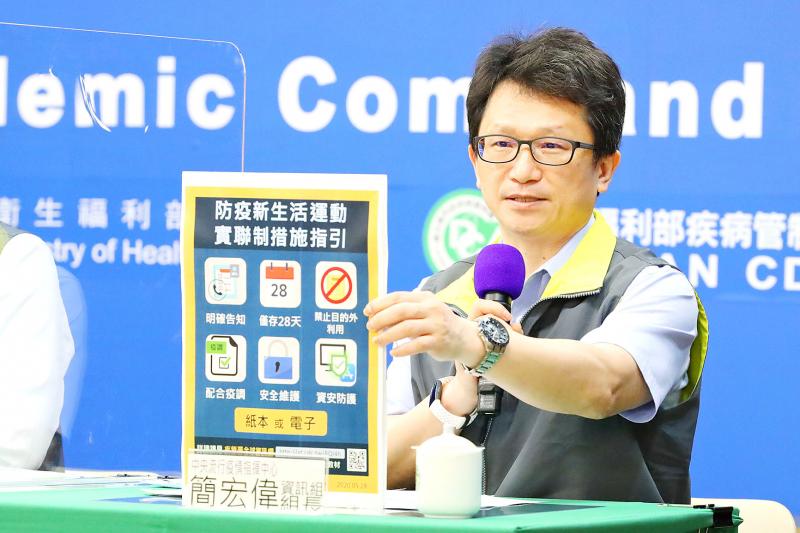The Central Epidemic Command Center (CECC) yesterday released guidelines for the collection of personal data by public venues for health authorities to use if needed for COVID-19-related investigations.
The purpose of collecting such information is to allow health authorities to contact visitors to a location quickly if necessary, it said.
The guidelines are meant for various operators who might find it necessary to ask people to register, Minister of Health and Welfare Chen Shih-chung (陳時中), head of the center, said at its daily briefing in Taipei.

Photo courtesy of the Central Epidemic Command Center
Collected information can only be used at the request of health authorities for COVID-19 investigations, said Chien Hung-wei (簡宏偉), who heads the center’s information team.
People should be told what type of information is being collected, its purpose, the person or entity responsible for its collection, and how the information is to be used, he said.
All information should be kept confidential and deleted after 28 days, he said.
If the information is being collected electronically, measures should be taken to ensure data security, he added.
The guidelines were announced as the center prepares to relax domestic regulations, including easing limits on crowd sizes for public events, after Sunday next week, as the nation continues its streak of no new local infections.
Among the nation’s 441 confirmed cases, 420 have been released from isolation, up from 419 on Wednesday, the center said.
The death toll also remained at seven.
Chen added that visitation rules for patients who have been hospitalized for more than seven days are also to be relaxed.
Patients would each be allowed up to two visitors per day within a specified time frame, he said.
Asked about the center’s quarantine plans for Hong Kongers who might be allowed to enter the nation under an action plan being prepared by the Mainland Affairs Council to provide humanitarian assistance, Chen said they would need to follow the center’s quarantine regulations, or new ones that are to be adopted.
Meanwhile, all 96 people who on Tuesday returned to Taiwan from Russia have tested negative for COVID-19.
Nine people who had shown symptoms were tested at Taiwan Taoyuan International Airport, with all results being negative as of Wednesday, while the other 87 people were tested at quarantine facilities, the center said.
Centers for Disease Control Deputy Director-General Chuang Jen-hsiang (莊人祥) said the agency is also coordinating with Thai authorities to check whether test results for 14 people who have returned to Thailand from Taiwan are available.
The Bangkok Post on Wednesday reported that among 165 Thais who returned home from Taiwan on Tuesday, 14 had been listed as patients under investigation for COVID-19, and had been admitted to hospital for examination.
Chen on Wednesday announced that the center’s daily news briefings would be reduced to once a week after Sunday next week.
The center has yet to decide on which day of the week they are to be held, Chen said yesterday.
Additional reporting by CNA

A strong continental cold air mass is to bring pollutants to Taiwan from tomorrow, the Ministry of Environment said today, as it issued an “orange” air quality alert for most of the country. All of Taiwan except for Hualien and Taitung counties is to be under an “orange” air quality alert tomorrow, indicating air quality that is unhealthy for sensitive groups. In China, areas from Shandong to Shanghai have been enveloped in haze since Saturday, the ministry said in a news release. Yesterday, hourly concentrations of PM2.5 in these areas ranged from 65 to 160 micrograms per cubic meter (mg/m³), and pollutants were

Taiwan’s armed forces have established response protocols for a wide range of sudden contingencies, including the “Wan Chun Plan” to protect the head of state, the Ministry of Defense (MND) said today. After US President Donald Trump on Saturday launched a series of airstrikes in Venezuela and kidnapped Venezuelan President Nicolas Maduro, concerns have been raised as to whether China would launch a similar “decapitation strike” on Taiwan. The armed forces regularly coordinate with relevant agencies and practice drills to ensure preparedness for a wide range of scenarios, Vice Minister of National Defense Hsu Szu-chien (徐斯儉) told reporters before a

EVA Airways on Saturday said that it had suspended a pilot and opened an investigation after he allegedly lost his temper and punched the first officer several times as their plane was taxiing before takeoff at Los Angeles International Airport. According to a report published on Thursday by The Reporter, the incident occurred after the flight’s Malaysian first officer tried to warn the Taiwanese pilot, surnamed Wen (文), that he was taxiing faster than the speed limit of 30 knots (55.6kph). After alerting the pilot several times without response, the first officer manually applied the brakes in accordance with standard operating

NOT AN OPENING: Trump’s violation of international law does not affect China’s consideration in attacking Taiwan; Beijing lacks capability, not precedent, an official said Taiwanese officials see the US’ capture of the president of Venezuela as a powerful deterrent to Beijing’s aggression and a timely reminder of the US’ ability to defeat militaries equipped with Chinese-made weapons. The strikes that toppled Venezuelan President Nicolas Maduro signaled to authoritarian leaders, including Chinese President Xi Jinping (習近平), US President Donald Trump’s willingness to use military might for international affairs core to US interests, one senior official in Taipei’s security circle said. That reassured Taiwan, the person said. Taipei has also dismissed the idea that Trump’s apparent violation of international law could embolden Beijing, said the official, who was not